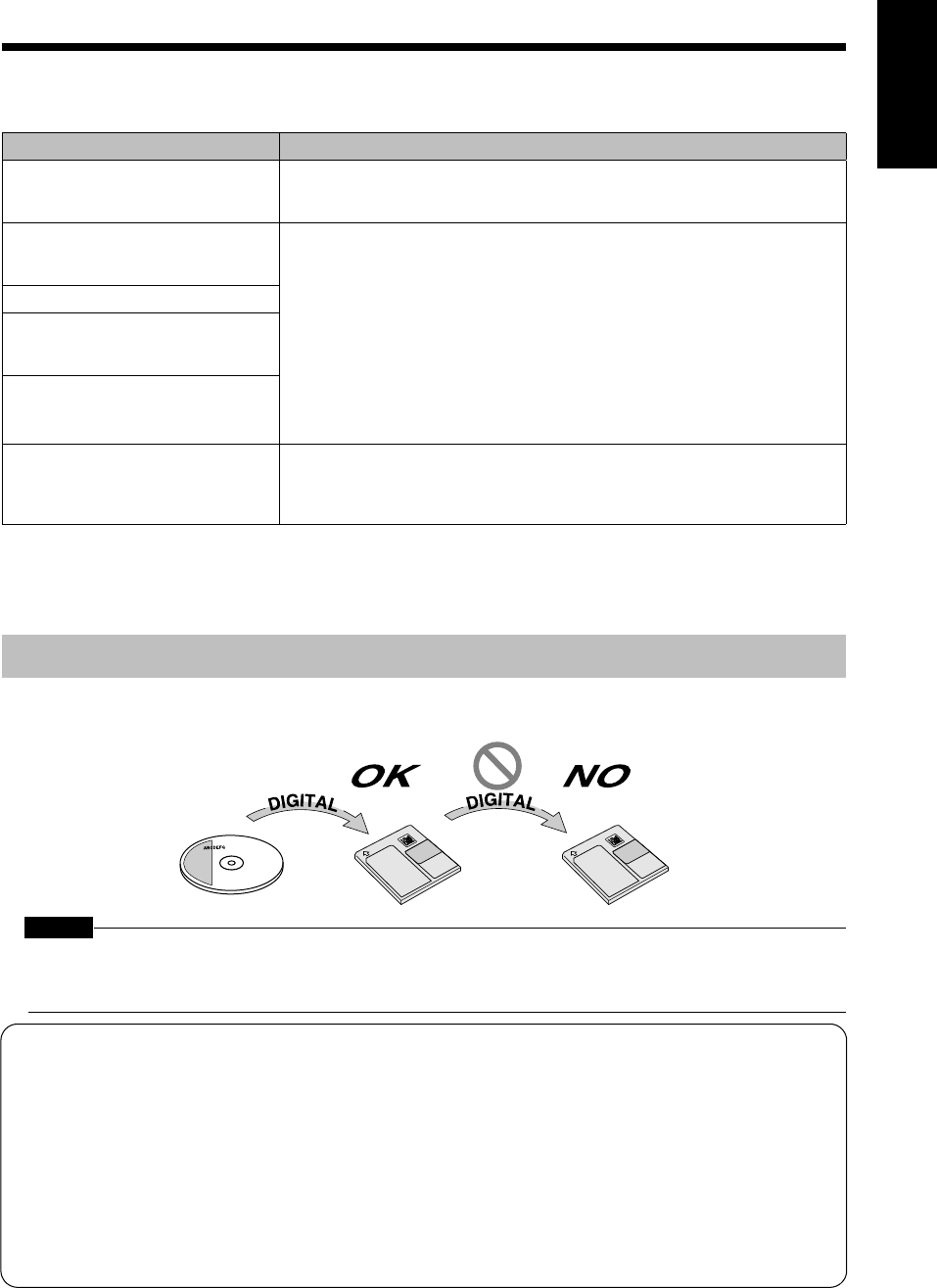
Introduction
44
English Reference
Reference
Restrictions on MDs
MDs employ an original recording method different from those used for cassette tapes and digital audio
tapes. Because the MD recording method has some restrictions, the following phenomena may occur. The
phenomena are not a malfunction of this product.
You can make a clear digital recording from a CD to an MD. However, you are prohibited from duplicating the
digitally recorded sound from that MD to another MD using the original digital signals. In short, you cannot
make "a copy of a copy". This rule is called the Serial Copy Management System (SCMS). This product is
designed to comply with this rule.
The Serial Copy Management System protects copyright and allows only first-generation digital copies from
the digitally recordable source.
CAUTION
• The SCMS does not permit you to record sound from a digitally recorded MD to other media as digital sound.
• You cannot digitally record a digitally recorded CD-R/CD-RW to an MD. "SCMS CANNOT COPY" appears and the
digital sound is converted to analog.
High Speed Copy Management System (HCMS)
You can record sound to an MD at a higher speed than normal recording. Therefore, restrictions are
required in order to protect copyright.
When you use this product to record a track of a CD with the high speed recording function, this
product does not permit you to use the high speed recording function to record the same track of a CD
to an MD within 74 minutes of the start of the first recording.
For instance, when you record the first track of a CD to an MD with the high speed recording function,
you cannot record the same track to an MD for 74 minutes after the first high speed recording started.
In addition, when recording tracks from a CD with the high speed recording function, you cannot
record 101 or more tracks within 74 minutes after recording starts. You can record up to 100 tracks in
such a case.
Phenomenon Possible cause
"DISC FULL" appears even though
recordable time as printed on the MD
remains.
Regardless of remaining recordable time, MDs have a limit on the number of
recordable tracks. You cannot record 255 or more tracks to an MD. (You can
record up to 254 tracks to an MD.)
"DISC FULL" appears even though
the track numbers and recordable
time have not reached the limit.
Repeated partial erasure and recording creates numerous time blanks on an
MD.
When you record a track to such an MD, the track is split up and a small portion
of the track is inserted into each time blank.
When the number of such split portions increases, "DISC FULL" may appear.
When a split portion is 8 or less seconds in SP mode (the standard stereo
recording mode), you cannot join it with another track.
In addition, when you erase such portions, remaining recordable time does not
increase.
With a track split among many time blanks, fast forward or fast reverse may pro-
duce intermittent sound dropouts.
You cannot join tracks that have different MDLP modes (SP/LP2/LP4).
You cannot join tracks or groups.
The remaining recordable time does
not increase even after you have
erased some tracks.
Sound drops out intermittently during
fast forward or fast reverse.
Recorded time plus remaining time is
shorter than the total recordable time
printed on the MD.
MD recording is possible only when there is a time blank of 12 or more seconds
consecutively (in SP mode (the standard stereo recording mode) ) on the MD.
Actual recording time is shortened on an MD that contains numerous time
blanks.
Serial Copy Management System (SCMS)
UX-Q1[UB].book 44 ページ 2004年7月21日 水曜日 午後1時44分


















